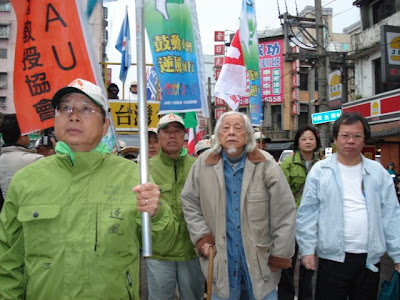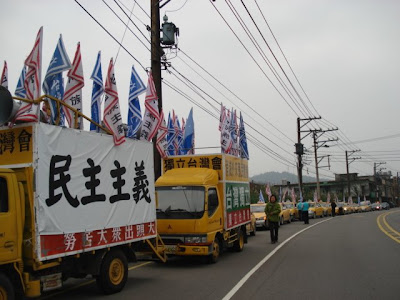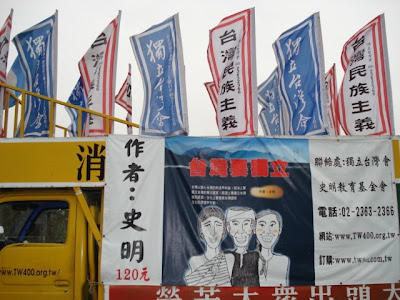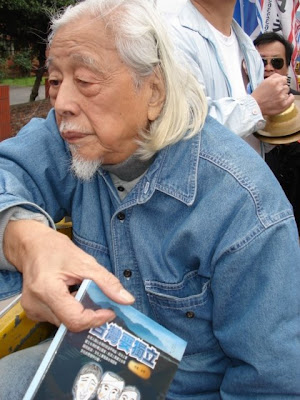Su Beng and Taiwan's 2008 pre-election atmosphere
Su Beng has been extremely busy since he returned to Taipei from Tokyo on February 25th. He was there to look in on his noodle shop, the “New Gourmet” (新珍味) restaurant which is located in Ikebukuro, Japan. A few days ago I met with him to continue work on the biography and to talk about the atmosphere in Taiwan, prior to the upcoming presidential elections.
With Taiwan’s presidential elections (on March 22) drawing near, numerous rallies have been organized for the presidential candidates, and Su Beng has been doing his part by attending rallies, talking to voters, and encouraging the undecided to vote.
The “Walk Against the Wind” was one such movement which supported Democratic Progressive Party (DPP) presidential candidate, Frank Hsieh (謝長廷). It was initiated by 12 young people, including former National Youth Commission chairwoman Cheng Li-chun (鄭麗君) on February 5th. The walk started in Oluanpi (鵝鸞鼻), the southernmost tip of the country, and finished on February 28th in Taipei.
If you'd like to know more about the “Walk Against the Wind”, click here.
Shortly after his return, on February 26th, Su Beng joined a segment of the “Walk Against the Wind” which was organized by the Taiwanese Association of University Professors (TAUP). The TAUP had set off from Tai Dong (which is on the east coast of Taiwan) and walked eastward.

Su Beng walked with the Taiwanese Association of University Professors in the "Walk Against the Wind".

And mobilized his Taiwan Independence Action motorcade to join them

One of the Taiwan Independence Action motorcade "propaganda trucks" with a poster of Su Beng's latest booklet Taiwan Should Be Independent.

A shot of "Walk Against the Wind" participants

He handed out copies of his booklet, Taiwan Should be Independent.

Here Su Beng sits on one of his “propaganda trucks” as he shouts to participants of the “Walk Against the Wind”: “There’s so many of you but you are not loud enough! Long live Taiwan Independence!”
I talked to Su Beng about the pre-election atmosphere, his views on the two presidential candidates and people’s attitudes towards the Taiwan independence issue.
The frustrating thing is that there have been many accounts floating around about the Chinese Nationalist Party’s aka Kuomintang’s (KMT) vote buying schemes and bribes.
According to Su Beng, the KMT has increased their vote buying tenfold and changed their vote buying strategies. Previously they’d pay a person NT$300-500 to vote for their candidate, but when this didn’t bring them the results they expected in the past two elections, they decided to change their strategy. Now they are using even more devious tactics by paying each person around NT$3000-5000, but this time around, people are only paid one-third upfront and are promised the remaining two-thirds of the payment only after the KMT presidential candidate, Ma Ying-jeou (馬英九) has been successfully elected.
This account has been floating around from several sources, not just from Su Beng. People have called in to political talk shows reporting such incidents, but unfortunately, as is so often the case in these situations, no one has been able to substantiate it as of yet.
On the Taiwanese people’s attitudes towards independence for Taiwan, Su Beng believes:
The independence of Taiwan is not a matter just to be decided solely by its people; there are some other outside forces that will impact it. 400 years ago many of our ancestors came from China; they had fled the oppressive Ching dynasty to seek a better life, and freedom, but the KMT didn’t teach us this history.
There has been a worldwide trend, wherein most colonized territories became independent after World War II, except for Taiwan. Many small countries and islands that are less developed and have lower standards of living than Taiwan have become independent. So, history is on our side, but Taiwan’s current political situation is not favorable.
Taiwanese people do not take action or heed other’s advice until things become really bad or serious. It’s as if things are fermenting, then after having been suppressed for so long, when things have reached a boiling point, then the Taiwanese will be galvanized into taking action.
The Taiwanese people want independence, it is a much more popularly accepted idea now, but still, many Taiwanese people can be bought. They don’t have any principles; they prefer the guarantee of having money.
Regarding the presidential candidates, the party platforms and what their election would mean for Taiwan, Su Beng had this to say:
If Ma Ying-jeou becomes president, then Taiwan will slowly be infiltrated by China. The KMT’s view is that Taiwan is a part of China; their goal is eventual unification of Taiwan and China. They are very firm and strong in these beliefs; these are among this party’s principles.
The DPP’s stance on Taiwan independence is not so firmly rooted. It began as an emotional reaction to the authoritarian rule of the KMT. The DPP lacks conviction, strategy and a rational approach in the fight for Taiwan independence.
If Frank Hsieh is elected, it will be an extension of President Chen’s policies, the DPP doesn’t have many firm policies, they have been just trying to fight off the KMT. The greens will feel at ease if Hsieh is elected, and take things calmly day by day. But if Ma is elected, the greens will feel more uncertain about the future, agitated and concerned. This may lead to aggression. Perhaps some oppositional, resisting forces will be organized, but the KMT dominated government will suppress people, and democracy and the path to independence will be impeded.
How does Su Beng think the clashes in Tibet will affect the Taiwanese?
What’s happening in Tibet may stimulate some thought amongst the Taiwanese, but it won’t have as much impact as it does on the people in the surrounding areas of Tibet. Tibet has a lower literacy rate and standard of living; the Tibetans are willing to lay down their lives to fight for their independence, but the Taiwanese are unable and unwilling to sacrifice themselves for the independence of Taiwan.
And finally, Su Beng commented on the Taipei Taxi Driver Association’s support of Ma Ying-jeou:
Well, democracy is a double-edged sword; it can be both good and bad. The Taipei Taxi Driver Association’s taxi drivers elect a president to represent them, but this also gives him a lot of power.
The rumor is that the KMT bribed the president of the Taipei Taxi Driver Association by giving him between NT$5 million and NT$ 20 million to distribute amongst taxi drivers in order to buy their votes. There were about 1000-1500 taxi drivers at the March 10th rally which was organized to support Ma Ying-jeou, but it’s unclear how many of these taxi drivers will actually vote for him.
On March 12th over 2000 taxi drivers participated in a rally to support DPP presidential candidate, Frank Hsieh. They wanted to borrow my “propaganda trucks” and megaphones, but unfortunately my megaphones were broken, so we couldn’t go, but many of the main organizers are amongst my supporters.
There are about 5000 taxi drivers affiliated with the Taipei Taxi Driver Association. Only about 1500 of 5000 taxi drivers were at the rally for Ma Ying-jeou.
*Special Thanks to Su Beng's assistant, Bin Hong (敏紅) who provided me with the photos and video footage included in this post
With Taiwan’s presidential elections (on March 22) drawing near, numerous rallies have been organized for the presidential candidates, and Su Beng has been doing his part by attending rallies, talking to voters, and encouraging the undecided to vote.
The “Walk Against the Wind” was one such movement which supported Democratic Progressive Party (DPP) presidential candidate, Frank Hsieh (謝長廷). It was initiated by 12 young people, including former National Youth Commission chairwoman Cheng Li-chun (鄭麗君) on February 5th. The walk started in Oluanpi (鵝鸞鼻), the southernmost tip of the country, and finished on February 28th in Taipei.
If you'd like to know more about the “Walk Against the Wind”, click here.
Shortly after his return, on February 26th, Su Beng joined a segment of the “Walk Against the Wind” which was organized by the Taiwanese Association of University Professors (TAUP). The TAUP had set off from Tai Dong (which is on the east coast of Taiwan) and walked eastward.
Su Beng walked with the Taiwanese Association of University Professors in the "Walk Against the Wind".
And mobilized his Taiwan Independence Action motorcade to join them
One of the Taiwan Independence Action motorcade "propaganda trucks" with a poster of Su Beng's latest booklet Taiwan Should Be Independent.
A shot of "Walk Against the Wind" participants
He handed out copies of his booklet, Taiwan Should be Independent.
Here Su Beng sits on one of his “propaganda trucks” as he shouts to participants of the “Walk Against the Wind”: “There’s so many of you but you are not loud enough! Long live Taiwan Independence!”
I talked to Su Beng about the pre-election atmosphere, his views on the two presidential candidates and people’s attitudes towards the Taiwan independence issue.
The frustrating thing is that there have been many accounts floating around about the Chinese Nationalist Party’s aka Kuomintang’s (KMT) vote buying schemes and bribes.
According to Su Beng, the KMT has increased their vote buying tenfold and changed their vote buying strategies. Previously they’d pay a person NT$300-500 to vote for their candidate, but when this didn’t bring them the results they expected in the past two elections, they decided to change their strategy. Now they are using even more devious tactics by paying each person around NT$3000-5000, but this time around, people are only paid one-third upfront and are promised the remaining two-thirds of the payment only after the KMT presidential candidate, Ma Ying-jeou (馬英九) has been successfully elected.
This account has been floating around from several sources, not just from Su Beng. People have called in to political talk shows reporting such incidents, but unfortunately, as is so often the case in these situations, no one has been able to substantiate it as of yet.
On the Taiwanese people’s attitudes towards independence for Taiwan, Su Beng believes:
The independence of Taiwan is not a matter just to be decided solely by its people; there are some other outside forces that will impact it. 400 years ago many of our ancestors came from China; they had fled the oppressive Ching dynasty to seek a better life, and freedom, but the KMT didn’t teach us this history.
There has been a worldwide trend, wherein most colonized territories became independent after World War II, except for Taiwan. Many small countries and islands that are less developed and have lower standards of living than Taiwan have become independent. So, history is on our side, but Taiwan’s current political situation is not favorable.
Taiwanese people do not take action or heed other’s advice until things become really bad or serious. It’s as if things are fermenting, then after having been suppressed for so long, when things have reached a boiling point, then the Taiwanese will be galvanized into taking action.
The Taiwanese people want independence, it is a much more popularly accepted idea now, but still, many Taiwanese people can be bought. They don’t have any principles; they prefer the guarantee of having money.
Regarding the presidential candidates, the party platforms and what their election would mean for Taiwan, Su Beng had this to say:
If Ma Ying-jeou becomes president, then Taiwan will slowly be infiltrated by China. The KMT’s view is that Taiwan is a part of China; their goal is eventual unification of Taiwan and China. They are very firm and strong in these beliefs; these are among this party’s principles.
The DPP’s stance on Taiwan independence is not so firmly rooted. It began as an emotional reaction to the authoritarian rule of the KMT. The DPP lacks conviction, strategy and a rational approach in the fight for Taiwan independence.
If Frank Hsieh is elected, it will be an extension of President Chen’s policies, the DPP doesn’t have many firm policies, they have been just trying to fight off the KMT. The greens will feel at ease if Hsieh is elected, and take things calmly day by day. But if Ma is elected, the greens will feel more uncertain about the future, agitated and concerned. This may lead to aggression. Perhaps some oppositional, resisting forces will be organized, but the KMT dominated government will suppress people, and democracy and the path to independence will be impeded.
How does Su Beng think the clashes in Tibet will affect the Taiwanese?
What’s happening in Tibet may stimulate some thought amongst the Taiwanese, but it won’t have as much impact as it does on the people in the surrounding areas of Tibet. Tibet has a lower literacy rate and standard of living; the Tibetans are willing to lay down their lives to fight for their independence, but the Taiwanese are unable and unwilling to sacrifice themselves for the independence of Taiwan.
And finally, Su Beng commented on the Taipei Taxi Driver Association’s support of Ma Ying-jeou:
Well, democracy is a double-edged sword; it can be both good and bad. The Taipei Taxi Driver Association’s taxi drivers elect a president to represent them, but this also gives him a lot of power.
The rumor is that the KMT bribed the president of the Taipei Taxi Driver Association by giving him between NT$5 million and NT$ 20 million to distribute amongst taxi drivers in order to buy their votes. There were about 1000-1500 taxi drivers at the March 10th rally which was organized to support Ma Ying-jeou, but it’s unclear how many of these taxi drivers will actually vote for him.
On March 12th over 2000 taxi drivers participated in a rally to support DPP presidential candidate, Frank Hsieh. They wanted to borrow my “propaganda trucks” and megaphones, but unfortunately my megaphones were broken, so we couldn’t go, but many of the main organizers are amongst my supporters.
There are about 5000 taxi drivers affiliated with the Taipei Taxi Driver Association. Only about 1500 of 5000 taxi drivers were at the rally for Ma Ying-jeou.
*Special Thanks to Su Beng's assistant, Bin Hong (敏紅) who provided me with the photos and video footage included in this post